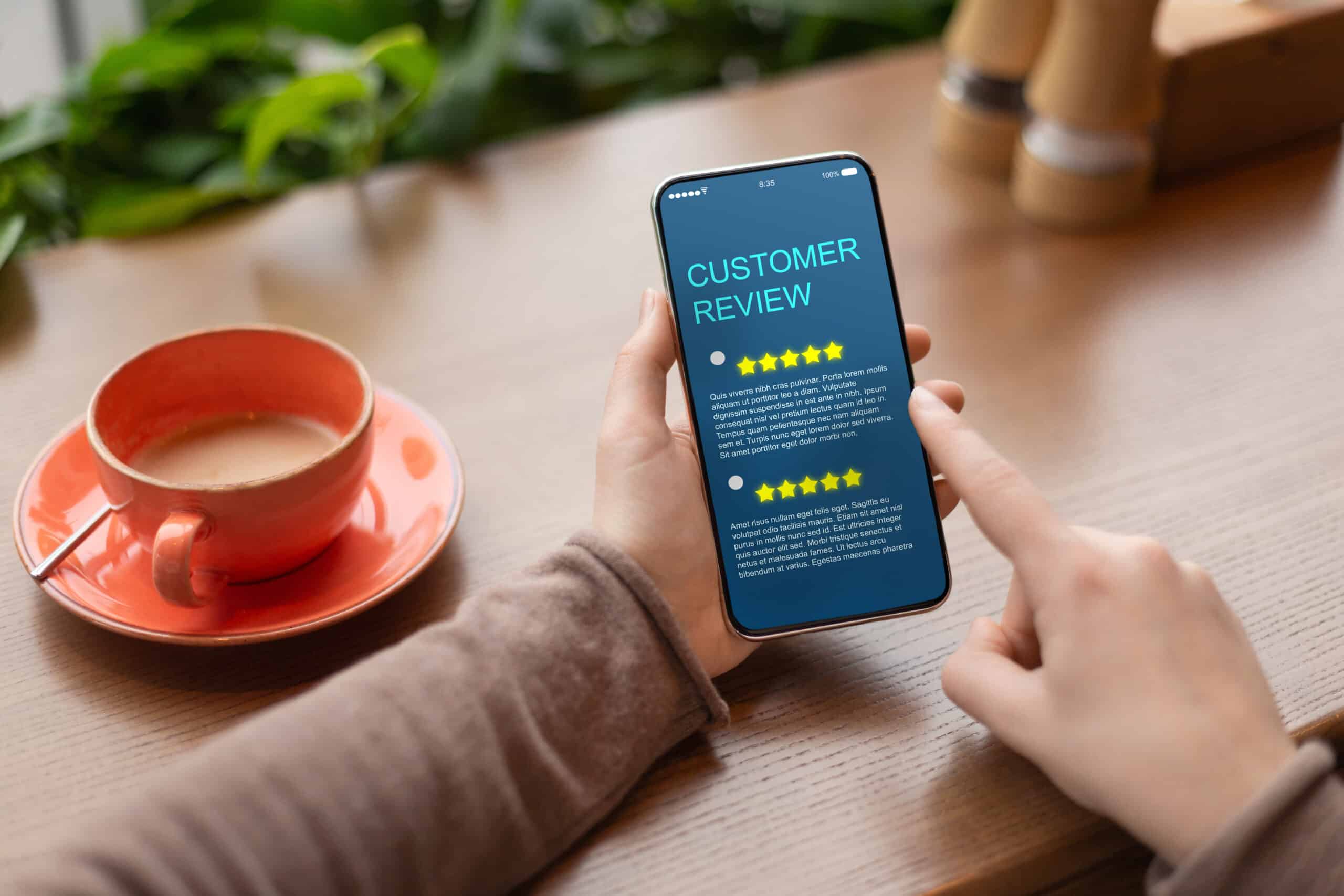
Maximizing Sales Using CRM With Email and SMS Integration
CRM (Customer Relationship Management) system helps businesses track and manage customer interactions.
It stores all customer data in one place, making it easy to access contact information, communication history, and sales records.
This simplifies tasks like follow-ups and helps teams stay organized and focus on building better connections.
Incorporating email and SMS features into your CRM strengthens your communication strategy by reaching customers across multiple channels.
SMS provides direct communication to make sure your messages are seen, while emails provide more detailed information.
In this article, we’ll explore CRMs that integrate email and SMS, helping you automate messages, track interactions, and improve your overall communication strategy.
Benefits of Using a CRM with Email and SMS
Email and SMS in your CRM offer a wide range of benefits for your business, particularly in how you engage with your customers.
This combination can lead to stronger relationships, increased customer satisfaction, and better marketing results. Let’s break down some of the key benefits.
Improved Communication Efficiency
With a CRM that integrates email and SMS, businesses no longer have to use separate platforms for different types of customer outreach.
For example, a business can send an email campaign promoting a sale and follow it up with an SMS reminder, all managed within the same CRM platform.
This coordination is essential for your customers to receive important updates without missing any messages.
When communications are handled across multiple platforms, there is often a risk of duplicating messages or sending inconsistent information.
A CRM that integrates email and SMS eliminates this risk by organizing all customer data in one place.
Higher Engagement Rates
While email is effective for long-form communication and visual content, SMS can be a follow-up tool, ensuring that important messages are seen quickly.
This two-pronged approach increases the likelihood that customers will take action, such as clicking a link or responding to a message.
Example:
A fitness studio could send an email announcing a new class package and follow up with an SMS as the registration deadline approaches. The SMS reminder encourages recipients to act quickly, which increases sign-ups and conversions.
Better Customer Retention
Retaining existing customers tends to be far more cost-effective than acquiring new ones. In fact, boosting customer retention by as little as 5% can increase profits by anywhere from 25% to 95%.
A CRM with email and SMS can play a vital role in customer retention by allowing businesses to send timely follow-ups, personalized offers, and service reminders.
Keeping communication consistent can increase customer loyalty and reduce churn rates. Customers who feel valued and appreciated will likely stick with your brand over time.
Personalized Customer Journeys
Personalization is a major factor in customer satisfaction.
With a CRM that integrates email and SMS, businesses can create customized customer journeys where every interaction is tailored to the customer’s preferences and behavior.
A CRM can help you track customer behavior, allowing you to send highly relevant messages at the right time.
This tailored experience fosters stronger customer relationships and improves their overall experience with your brand.
Cost-Effective Marketing
While email marketing is already known for being a cost-effective way to reach customers, adding SMS into the mix can further optimize marketing efforts.
Unlike pay-per-click ads or paid social media campaigns, email marketing has little to no cost per message.
Many CRM platforms include email functionality as part of their subscription, meaning you can send thousands of emails without increasing expenses.
While SMS marketing does have a small per-message cost, it is still a highly cost-effective strategy due to its high engagement rates. SMS boasts open rates of up to 98%, meaning the recipient sees nearly every message sent.
Although there’s a per-message cost (usually a few cents per SMS), the high open and response rates make it worthwhile. As with other marketing methods, you’re paying for results, not just impressions.
Key Considerations When Choosing CRM Software
With so many CRM systems available, it’s essential to consider several factors to find the one that best fits your needs.
Below is a detailed guide on what to look for when choosing a CRM that integrates both email and SMS functionality.
Ease of Use
An intuitive and user-friendly CRM platform will have a direct impact on the productivity and efficiency of your team.
An easy-to-use system allows your team to focus more on customer engagement and less on learning the software.
If the software is difficult to operate, it defeats the purpose of having a CRM in the first place. Your team should be able to:
- Quickly access customer data.
- Navigate through the interface to perform essential tasks such as sending emails or managing workflows.
- Use built-in features without extensive training or the need for constant technical support.
Email and SMS Integration
Not all CRMs have built-in email and SMS functionality, so it’s essential to check whether the platform offers native support for these communication channels or if you’ll need to rely on third-party integrations.
Some customers prefer email for detailed communication, while others respond better to the immediacy of SMS. Having both options helps you reach your audience in the way that suits them best.
With email and SMS integrated into your CRM, you can create automated workflows that combine both channels.
You might send an email as part of a marketing campaign and then follow up with an SMS reminder for those who haven’t opened the email.
Automation and Workflow Capabilities
Manually managing every aspect of customer engagement can be time-consuming.
You must check if the CRM allows automated email and SMS marketing campaigns based on customer triggers (e.g., a welcome message when someone signs up, appointment reminders, or abandoned cart follow-ups).
Scalability
A CRM that is not scalable can become a bottleneck as your business grows. A system that worked well when you had a few hundred customers may struggle to handle thousands of contacts, leading to slowdowns, inefficiencies, and poor user experience.
Investing in a scalable CRM makes sure you won’t have to switch platforms frequently as your business expands. This will save you time, resources, and training costs.
Scalable CRMs offer tiered pricing models that allow you to start small and increase your subscription level as your business grows.
If you’re not paying for features or capacity you don’t yet need, you can still upgrade when the time is right.
Customer Segmentation and Personalization
Segmentation and personalization enable businesses to send the right message to the right person at the right time.
Instead of a one-size-fits-all approach, segmentation allows you to understand your customers better and deliver more targeted and meaningful communication.
A CRM should allow you to create detailed segments based on various criteria, such as:
- Demographics: Segment by age, gender, location, or income
- Behavioral data: Segment based on customer actions, such as past purchases, website visits, or email interactions
- Engagement levels: Segment customers based on how often they interact with your content, such as those who have opened your emails or clicked on links
- Purchase history: Identify high-value customers or repeat buyers and target them with special offers or rewards
Dynamic segmentation automatically updates customer segments based on real-time behaviors and interactions. Your campaigns will always target the most relevant audience without manual updates.
For example, if a customer makes a purchase, they can be automatically moved from a “leads” segment to a “repeat customers” segment, triggering follow-up emails or SMS messages that align with their new status.
Drip campaigns are automated messages (email or SMS) sent over time to nurture leads or engage customers.
Effective CRMs allow you to segment customers based on their position in the funnel or previous interactions with your brand and deliver highly targeted drip campaigns.
Analytics and Reporting
Analytics and reporting allow businesses to understand how well their campaigns are performing. Metrics like open rates, click-through rates, and conversion rates offer insights into customer engagement.
Additionally, these tools help businesses optimize future campaigns by identifying which messages resonate with different customer segments.
Understanding customer behavior—such as which emails or SMS messages lead to conversions—helps improve targeting and personalization.
Customer Support and Training
No matter how sophisticated a CRM may be, businesses will likely encounter technical challenges or require assistance with new features as they scale. Responsive and reliable customer support helps resolve these issues and minimize downtime.
You should look for platforms that offer multiple support channels, such as email, live chat, and phone support.
The availability of 24/7 support is a bonus, especially for businesses operating across different time zones or during non-traditional hours.
Strong customer support and training also speed up the onboarding process for new users and reduce the learning curve for new team members.
Poor support can lead to frustration, lost productivity, and a lower return on investment (ROI) as teams struggle to make the most of the system.
Many CRM providers offer guided onboarding processes, including step-by-step setup instructions, walkthroughs, and one-on-one consultations. This helps ensure that the system is properly configured from the start.
Integration with Other Tools
Most businesses use several tools to manage their operations, such as accounting software, marketing platforms, and customer support systems. Choose a CRM that integrates smoothly with the tools you’re already using.
Many CRMs offer native integrations with popular software tools. These pre-built, direct connections allow the CRM to easily sync with other platforms without the need for custom development or complex setups.
Common native integrations include email marketing tools like Mailchimp, SMS service providers like Textellent, and project management software like Trello or Monday.com.
If your business uses custom or less common tools, you’ll need a CRM with an open API. An open API allows developers to build custom integrations with virtually any software platform, offering greater flexibility for businesses with unique needs.
This is particularly useful for integrating proprietary systems or niche tools that might not have native integrations available.
5 Best CRM Solutions with Email and SMS Integration
The market has various CRM platforms, each offering different features and benefits.
When looking for a CRM with email and text messaging capabilities, it’s essential to understand what each platform offers and how it can meet your business needs.
Below are some of the top CRM solutions that combine email and SMS integration:
1. HubSpot CRM
HubSpot is a free, easy-to-use platform that helps businesses manage customer relationships and grow. It includes essential tools like contact management, email tracking, and lead nurturing.

Image Source: HubSpot
The Live Chat feature allows real-time communication with website visitors to convert leads and provide support. HubSpot’s AI Content Writer assists in quickly generating content ideas for marketing, while its drag-and-drop Website Builder makes customizing websites simple.
Email and SMS Integration
You can connect your email with HubSpot to automatically track and manage sequences, replies, and actions directly from your inbox.
While HubSpot does not offer native SMS functionality, it integrates seamlessly with third-party SMS tools like Textellent, allowing businesses to add SMS marketing to their CRM workflows. This combination enables multi-channel campaigns that reach customers through both email and SMS.
Pricing
- Free Plan: Foundational tools for marketing, sales, and service at $0
- Starter Customer Platform: Essential tools for marketing, sales, and operations at $20/month per seat
- Professional Customer Platform: Comprehensive software for marketing, sales, service, and content, starting at $1,300/month
- Enterprise Customer Platform: HubSpot’s most advanced tools for large-scale operations, starting at $4,300/month
2. Salesforce
Salesforce CRM is a cloud-based platform that helps businesses manage leads, sales, and customer relationships. Its lead management feature includes a detailed activity timeline that keeps contact information current.
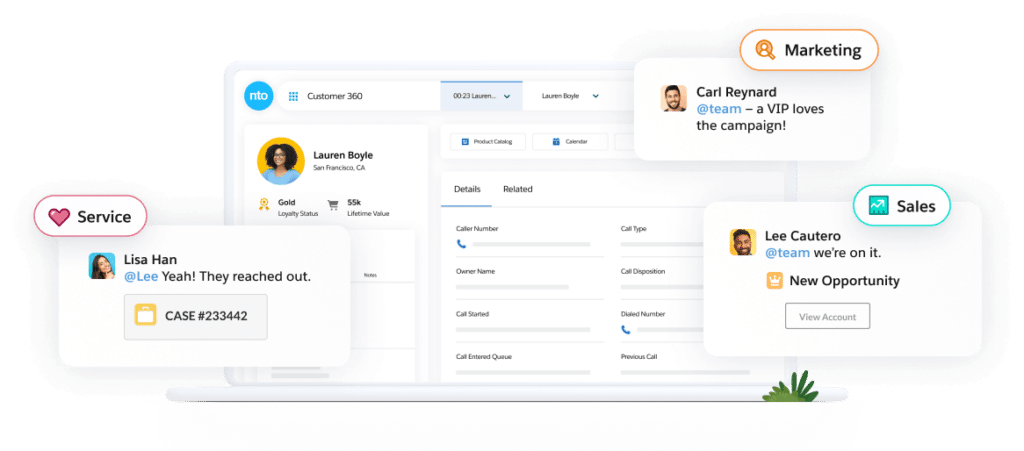
Image Source: Salesforce
With AI integration, Salesforce boosts productivity by providing predictive insights to help teams make smarter decisions. Tools like Sales Cloud help capture leads, track performance, and organize sales, while Revenue Cloud also reduces costs by automating quotes.
Marketing Cloud allows businesses to automate campaigns, track ROI, and view analytics—all from a single interface. Salesforce also supports automation, workflows, and approvals to streamline operations.
Email and SMS Integration
This CRM system integrates with Outlook® and Gmail™, so representatives can manage Salesforce records directly from their inbox, simplifying email, event, and task management.
Additionally, with the Salesforce Messaging App, users can easily send SMS and text messages to customers for quick follow-ups and notifications.
Pricing
- Starter Suite: Basic CRM tools for marketing, sales, service, and commerce at $25/user/month
- Pro Suite: Improved CRM suite with advanced tools for marketing, sales, and service at $100/user/month
- Enterprise: Flexible CRM with web API support, priced at $165/user/month
- Unlimited: CRM with intelligent automation and developer support at $330/user/month
- Einstein 1 Sales: Comprehensive Salesforce solution for sales teams at $500/user/month
3. Zoho CRM
Zoho CRM is a flexible cloud-based platform designed to manage customer relationships for businesses of all sizes. It integrates with over 300 third-party apps, including G Suite and Office 365, and over 40 Zoho products.
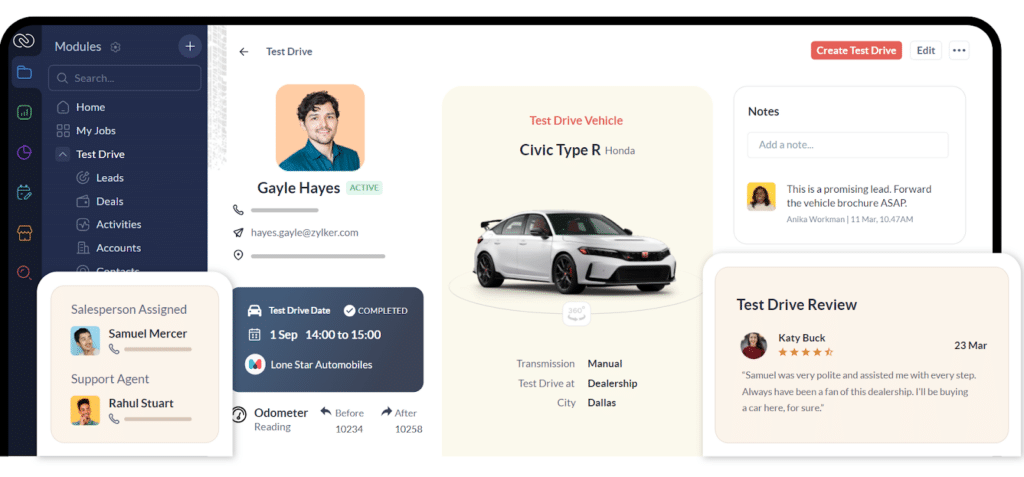
Image Source: Zoho
The platform’s AI assistant, Zia, helps sales teams with intelligent alerts, task reminders, and anomaly detection. Zoho CRM also supports omnichannel communication to engage customers via email, live chat, phone, and social media.
The Advanced CRM Analytics feature provides custom dashboards and insights to track leads, revenue, and deals.
Email and SMS Integration
Zoho provides email and SMS integration, making it easy to manage customer communication from one platform.
Zoho Mail integrates with Zoho CRM to simplify email and contact management. You can add email contacts as leads or potentials to your CRM. You can also view CRM contact details while composing emails and link tasks or notes to contacts directly from your inbox.
Pricing
- Standard: $20/user/month – Streamline sales and workflows
- Professional: $35/user/month – Boost customer growth
- Enterprise: $50/user/month – Use AI and customization tools
- Ultimate: $65/user/month – Gain advanced tools and business insights
4. ActiveCampaign
ActiveCampaign enables businesses to automate personalized customer experiences across all touchpoints. It tracks customer preferences, behaviors, and custom attributes for deeper segmentation and more effective targeting.
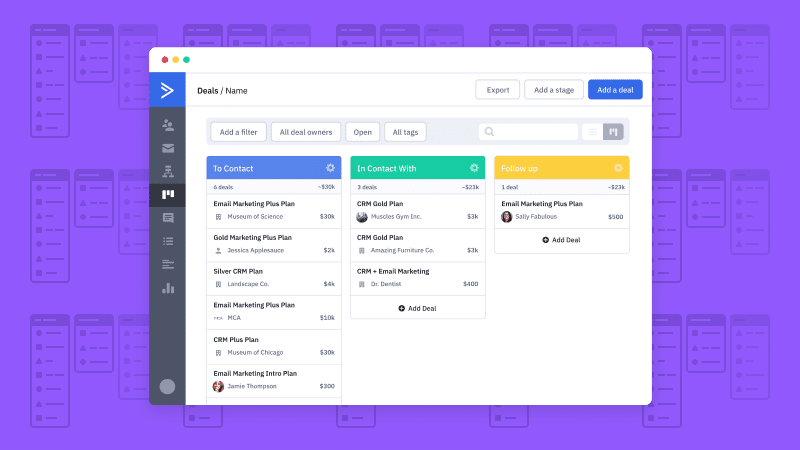
Image Source: ActiveCampaign
You can customize messages based on any parameter, ensuring relevance for each audience. The platform uses CRM data from the entire customer lifecycle to optimize content, send time, and delivery channels.
ActiveCampaign simplifies the creation of custom campaigns that adapt in real-time based on customer behavior, replicating a personalized experience at scale, no matter how large the business grows.
Email and SMS Integration
You can connect multiple Gmail, IMAP, or Exchange accounts to the Deals CRM, and emails will automatically sync between your contacts and your ActiveCampaign account.
You can also set up automated SMS using triggers for reminders, notifications, abandoned cart nudges, and more, based on customer actions.
Pricing
- Enterprise: $145+/mo – For running large-scale campaigns with enterprise support
- Pro: $79+/mo – Unlock full omnichannel marketing automation
- Plus: $49+/mo – Offers automation and customer insights
- Starter: $15+/mo – Ideal for getting started with personalized marketing campaigns
5. Textellent
Textellent is not a traditional CRM but is often used as an add-on to many CRM platforms to enable SMS communication. It’s a powerful messaging platform that integrates seamlessly with popular CRMs like HubSpot, Salesforce, and Zoho.
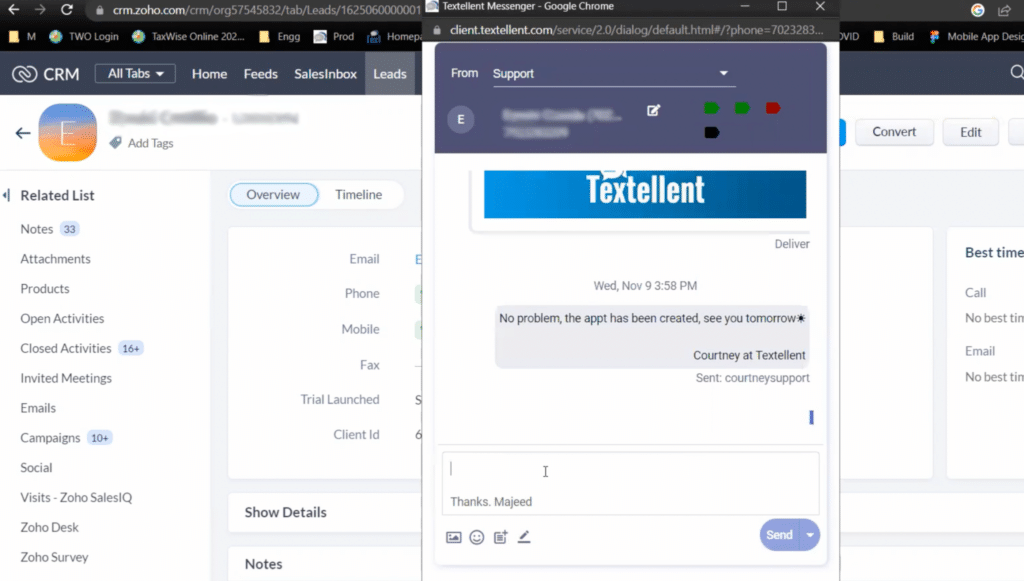
It allows you to send personalized texts directly from your CRM while viewing past conversations for better follow-ups. Textellent also supports rich media, so you can include logos, images, and links to drive interaction.
Customized templates simplify appointment reminders, confirmations, and promotions for consistent and effective communication.
Here’s what makes Textellent the best SMS CRM:
- Uses your business phone numbers to maintain customer trust
- Allows sending images and multimedia through SMS & MMS
- Automates appointment reminders, feedback, and future bookings with advanced tools
- Integrates easily with existing scheduling apps or works on its own
- Targeted messaging with advanced segmentation and tagging
- Ideal for lead generation, nurturing, and drip campaigns
- Manages campaigns across multiple locations with multi-site support
- Includes compliance tools for SMS regulations
- Tracks campaign performance with ready-to-use message templates
Pricing
Textellent offers great value with flexible pricing and industry-specific features:
- Free trial: Try all key features free for two weeks
- Essential plan: $49/month for 750 SMS credits (incoming messages are free)
- Standard plan: $99/month for two users with 2,000 SMS credits
- Premium plan: Custom pricing for businesses with larger needs based on the number of users, SMS credits, and additional features
How to Set Up a CRM with Email and SMS
Whether starting from scratch or integrating new features into an existing CRM, the following steps will help you get started. We’ll cover everything from the initial setup to automating your campaigns for both email and SMS.
Select a CRM Platform
Choose a CRM that supports both email and SMS functionalities. For example, use Salesforce or HubSpot for your email marketing needs and integrate Textellent for SMS communication. Textellent seamlessly connects with these CRMs to add powerful SMS capabilities.
Look for a CRM that allows you to automate both SMS and email workflows. For instance, Salesforce offers Sales Cloud, which provides AI-driven automation that triggers messages based on customer behavior. Similarly, HubSpot offers marketing automation to create customer journeys across SMS and email.
Set Up SMS Integration
Integrate Textellent into your existing CRM by connecting the platforms. This allows you to manage SMS directly from your CRM, sending and viewing personalized text messages alongside email interactions for better organization.
If you chose Zoho, here’s a quick example of how to integrate this CRM text messaging for SMS communication:
- Open a Contact or Deal in Zoho CRM.
- Click “Send Text” in the upper-right corner.
- A Textellent popup will appear, allowing you to manage SMS within Zoho.
- You can view conversation history, use templates, add tags, choose your phone number, and send SMS or MMS without leaving Zoho CRM.
Create SMS and Email Campaigns
Once you integrate Textellent with your CRM, you can create SMS and email campaigns. You can use the CRM’s built-in tools to segment your audience and send targeted, personalized emails for email campaigns.
You can also use Textellent to manage SMS campaigns, sending reminders, promotions, and confirmations directly from the CRM, enriched with templates and media like images or PDFs.
You may automate workflows to trigger SMS or email follow-ups based on customer behavior for consistent communication across both channels.
Monitor and Optimize
Once your SMS and email campaigns are up and running, monitoring and optimizing them is essential for success. You must use the CRM’s analytics tools to track key metrics like open rates, click-through rates, and response times for both SMS and email.
Platforms like Textellent also provide detailed reporting for SMS campaigns, which allows you to assess engagement and customer interactions.
Based on this data, adjust your messaging strategies—such as tweaking timing, content, or audience segmentation—to improve performance and maximize your campaign effectiveness.
Boost Outreach with SMS, Integrated Seamlessly in Your CRM
Textellent is the best SMS solution to integrate directly with your CRM if you want to boost your customer interactions.
You can send personalized messages, automate appointment reminders, and engage in real-time conversations from your CRM platform.
While your CRM handles email strategies, Textellent boosts your outreach with automated SMS appointment reminders, personalized promotions, and real-time conversations. This powerful combination promotes consistent communication across both channels.
Textellent’s native CRM SMS integrations and robust APIs allow you to automate and synchronize your SMS and email outreach to maximize customer interaction and satisfaction.

Sign up for a free trial or request a demo consultation.
FAQs About CRM with Email and SMS
Are there any limits on how many SMS or emails I can send through a CRM?
Most CRMs offer tiered pricing plans that limit the number of SMS and emails you can send. These limits can often be adjusted based on your business’s needs.
How does a CRM optimize sales follow-ups?
CRMs automate phone calls, emails, and SMS reminders, ensuring timely follow-ups. This keeps the sales process moving and prevents missed opportunities for engagement.
How does a CRM improve sales and marketing processes?
A CRM simplifies sales and marketing by automating lead tracking, customer follow-ups, and personalized communication. It helps align these processes so sales and marketing teams can collaborate more effectively to generate and convert leads.





